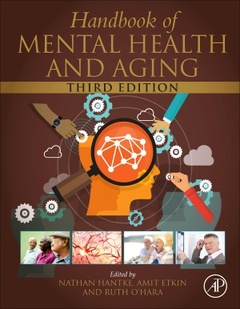Handbook of Mental Health and Aging (3rd Ed.)
Coordonnateurs : Hantke Nathan, Etkin Amit, O'Hara Ruth

The Handbook of Mental Health and Aging, Third Edition provides a foundational background for practitioners and researchers to understand mental health care in older adults as presented by leading experts in the field. Wherever possible, chapters integrate research into clinical practice. The book opens with conceptual factors, such as the epidemiology of mental health disorders in aging and cultural factors that impact mental health. The book transitions into neurobiological-based topics such as biomarkers, age-related structural changes in the brain, and current models of accelerated aging in mental health. Clinical topics include dementia, neuropsychology, psychotherapy, psychopharmacology, mood disorders, anxiety, schizophrenia, sleep disorders, and substance abuse. The book closes with current and future trends in geriatric mental health, including the brain functional connectome, repetitive transcranial magnetic stimulation (rTMS), technology-based interventions, and treatment innovations.
List of Contributors Preface
1. Concepts and Issues in Mental Health and Aging Nathan Hantke and Ruth O'Hara
2. Epidemiology of Selected Mental Disorders in Later Life Brenna N. Renn, Patricia A. Arean and Jurgen Unutzer
3. Culture and Ethnicity in the Mental Health of Older Adults Lucas Torres, Claire Bird and Felicia Mata-Greve
4. Stress, Mental Health, and Aging Raeanne C. Moore, Elizabeth Straus and Laura M. Campbell
5. Structural Changes in the Aging Brain Meghan Riddle and Warren D. Taylor
6. Sleep-Dependent Cellular Chemical Changes in the Aging Brain Gordon X. Wang and Philippe Mourrain
7. Biomarkers of Cognitive Impairment in Late-Life Depression Breno S. Diniz and Meryl A. Butters
8. Accelerated Brain Molecular Aging in Depression Rammohan Shukla and Etienne Sibille
9. Cognitive Dysfunction in Late-Life Psychiatric Disorders: Phenotypes, Risk Factors, and Treatment Targets Christina F. Chick, Casey Buck and Ruth O'Hara
10. Suicide in Late Life Joshua T. Jordan and Lauren A. Anker
11. Anxiety and its Disorders in Old Age Sherry A. Beaudreau, Christine E. Gould, Susan Sharp Kolderup and Nehjla Mashal
12. Bipolar Disorders in Older Adults Laura Hein, Annemiek Dols and Lisa T. Eyler
13. Positive Psychiatry and Successful Aging in People with Schizophrenia Dilip V. Jeste, Ryan Van Patten and Ellen E. Lee
14. Alzheimer's Disease and Other Neurocognitive Disorders Lucy Y. Wang, Beth Ann LaBardi, Murray A Raskind and Elaine R Peskind
15. Substance Use Disorders in the Elderly Tylor J. Jilk and Martin S. Mumenthaler
16. Sleep Disorders and Aging Logan Schneider, Rosy Karna, Makoto Kawai and Kai Parker-Fong
17. Aging of Persons with Neurodevelopmental Disabilities Lauren A. Anker, Christina F. Chick and Joachim F. Hallmayer
18. Bereavement and Grief Danielle K. Florioso, Alana Iglewicz and Sidney Zisook
19. Neuropsychology with Older Adults Nathan Hantke and Nicholas T. Bott
20. Integrative Precision-Medicine Approach to Cognitive Assessment in Older Adults Sharon Naparstek, Omer Linkovski and Limor Gertner
21. Functional Assessment in Geriatric Mental Health Adriana Seelye, Sarah Brown, Katherine Dorociak, Jeffrey Kaye, Katherine Wild and Snezana Urosevic
22. Psychotherapeutic Interventions with Older Adults: Now and Into the Future Leander K. Mitchell and Nancy A. Pachana
23. Psycopharmacologic Treatment Vimal M. Aga, Mujeeb U. Shad, Hongru Zhu and Carl Salzman
24. Technology-Based Mental Health Assessment and Intervention Christine E. Gould, Flora Ma, Julia R. Loup, Christine Juang, Erin Y. Sakai and Renee Pepin
25. Community and Home Care for Mentally Ill Older Adults Erin Cassidy-Eagle
26. Forensic and Ethical Issues Mousa S. Botros, Julie E. Guzzardi, Regina M. Carney, Spencer Eth and Gregory B. Leong
27. The Economics of Geriatric Mental Health Care Nicholas T. Bott
28. The Future of Mental Health and Aging Nathan Hantke, Ruth O'Hara, Sherry A. Beaudreau and Amit Etkin
Author Index Subject Index
Clinicians, researchers, and students in psychology, gerontology, psychiatry, neuroscience, and other related health care professions tasked with caring for the aging population
Amit Etkin, MD, PhD, is an Associate Professor of Psychiatry and Behavioral Sciences at Stanford University, a member of the Stanford Neurosciences Institute, and an Investigator in the VA Sierra-Pacific Mental Illness Research Education and Clinical Center (MIRECC) at the Palo Alto VA. Dr. Etkin is trained as both as a neuroscientist and psychiatrist. The overarching aim of the Etkin lab is to understand the neural basis of emotional disorders and their treatment, and to leverage this knowledge to better understand how the brain works and to develop novel treatment interventions. In support of this goal, Dr. Etkin also collaborates with neuroscientists, engineers, psychologists, physicians and others to establish a new intellectual, scientific and clinical paradigm for understanding and manipulating human brain circuits in healthy individuals and for treating psychiatric disease.
Dr. Ruth O’Hara is an Associate Chair and Associate Professor in the Department of Psychiatry and Behavioral Sciences and Director of the Translational Research Core of the Veterans Affairs Sierra-Pacific Mental Illness Research Education and Clinical Center (MIRECC). Her research focuses on longitudinal investigations of the relationship between neurocognitive and neuropsychiatric symp
- Identifies factors influencing mental health in older adults
- Includes biological, sociological, and psychological factors
- Reviews epidemiology of different mental health disorders
- Supplies separate chapters on grief, schizophrenia, mood, anxiety, and sleep disorders
- Discusses biomarkers and genetics of mental health and aging
- Provides assessment and treatment approaches
Date de parution : 04-2020
Ouvrage de 512 p.
21.4x27.6 cm
Thèmes de Handbook of Mental Health and Aging :
Mots-clés :
Accelerated aging; Access to care; Activities of daily living; Addiction medicine; Aging; Agitation; Alcohol use disorder; Alzheimer’s disease; Anxiety; Autism spectrum disorder; Benzodiazepine use disorder; Bereavement; Biomarkers; Brain atrophy and connectivity; Brain–behavior interactions; Caregivers; Cellular aging; Chronic stress; Cognition; Cognitive decline; Cognitive impairment; Communication disorders; Comorbidities; Complicated grief; Computerized testing; Cortical thickness; Cross-dia



